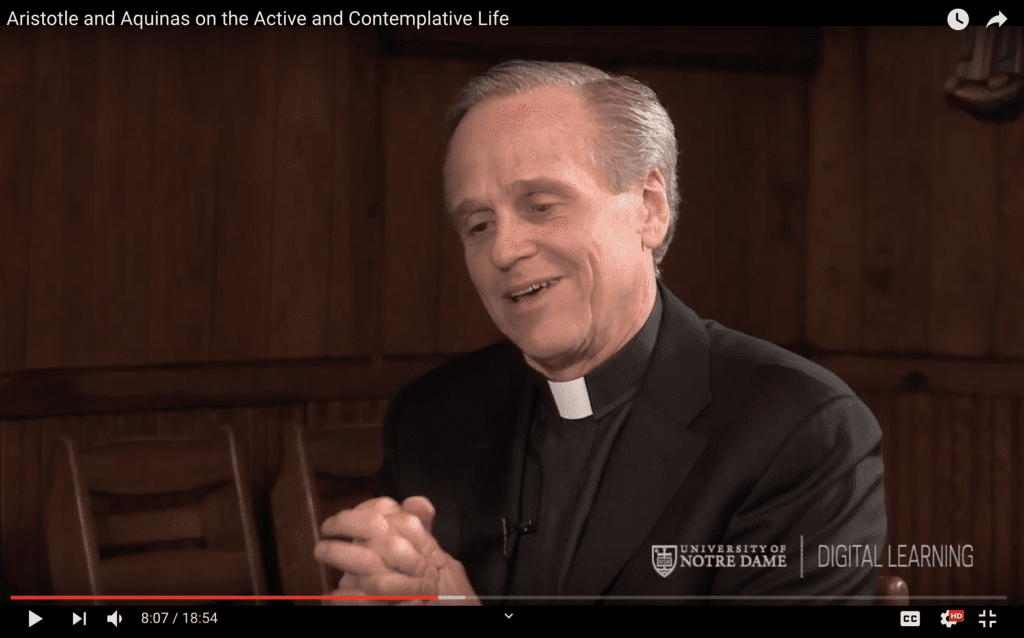Part 4: The Greatest Good

In Aristotle's view, everything we do is goal-directed. Perhaps surprisingly, he also thinks that all of these goals eventually converge on the ultimate goal of happiness (which he calls the "greatest good"). Today, we'll look at his definition of happiness and see how it can help us organize and live complete, fulfilled lives.
Lecture 4: The Greatest Good
Presented by Meghan Sullivan
Good things come in all shapes and sizes, but, interestingly, some of these goods are things we can compare. A good watch just isn’t as good as a good dog. And neither of these items can compare with the goodness of a beloved child. In this lecture, Meghan explores the idea that there is one, singular good that is greater than all other goods, and that this good holds the key to living a good life.
What Will Make You Happy?
Presented by Paul Blaschko

It can be surprisingly hard to know what will make us happy. To take a simple example: Think about the last time you ordered a steak, only to immediately regret not having gone with the chicken. To take a more serious one: Think about a time when you set yourself a serious life goal, and accomplished it, only to realize that you weren’t as fulfilled and satisfied as you’d long imagined.
There are many ways to work around this difficulty, but psychologists at Harvard have been hard at work for nearly 80 years working on one of the most interesting approaches to this question.
The Grant Study, one of the longest running psychological studies in history, followed nearly 300 men from their freshman year of college until their death. The results are summarized by its last director here, and are really quite moving. Readers of the study (or books summarizing it) can learn quite a lot by observing patterns in lives that we can see to be generally happy or generally unhappy.
Today, Meghan will refocus discussion on a question that arose on day one: what is your ultimate goal. We’ll use the tools we’ve learned in the past few weeks to reflect more deeply on our answers. And you’ll be introduced to different philosophers who answer this question in importantly different ways.
Case Study: What is True Happiness?
Presented by Meghan Sullivan
If the greatest good is happiness, then it’s important that we distinguish true happiness from things that just so happen to be called “happiness.” In this video, Meghan helps us think through this task.
Activity: Making Good Connections
Presented by Paul Blaschko
If all goods are related in some way, it’s important to understand how. In this exercise, you’re invited to reflect on how you organize and prioritize the things you consider good in your life. The worksheet will help you with this final activity (full color or printer-friendly).
Additional Resources
Fr. John Jenkins on Aquinas and Beatitude Crash Course Philosophy on Plato and Aristotle Crash Course on Existentialism
Readings:
- Excerpts from Nietzsche’s writings on morality and the good life (an interactive text).
- Excerpts from Soren Kierkegaard, a Christian existentialist (an interactive text).
- Excerpts from William James on the importance of faith to living a good life (an interactive text).
Reflection/Discussion Questions
Consider the following questions yourself or in a group setting. For hosting a Big Questions discussion group use the Discussion Leader Guide.
1. Make a list of the important things in your life. Which of them would you consider essential?2. Describe the role you think pleasure should play in the good life.
3. Describe the thing you would do or life you would live if money were no object.
3. Is it morally better to maximize and donate your income, or to care for those in need personally even though you’ll have less of an impact?
4. Give an example of something good you’ve done. How much of the credit do you deserve and how much of it was just due to the situation you found yourself in?
5. If there were no consequences, do you think more people would behave justly or unjustly? Why?
6. Do you think there is a conflict between your personal obligations to love and good public policy (i.e. how to treat immigrants)? Why or why not?
7. Think about one of your role models and describe his or her behavior. How does he or she showcase moral behavior?
8. If you had to form a group (like an advisory board) to help you guide your life, who would be on it and why?
Congratulations!
You’ve now completed all four parts of the course, “What Makes a Life Good?” Along the way, we reflected on goodness and value, and asked some big questions about how philosophy can help us live better lives. To learn even more about these topics, visit the “additional resources” sections on each course page.
We look forward to seeing you back for the second Big Questions course, where we’ll explore the issues of faith and belief.



